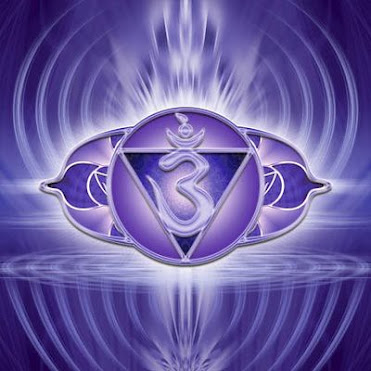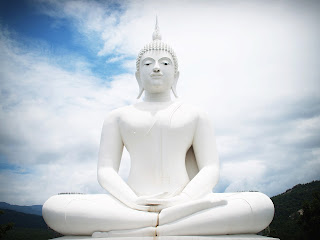Spirituality Quotes
Excerpts from The Holy
Srimad Bhagvadgeeta
Backdrop: It is the opening of the actual discourse in Srimad Bhagvadgeeta. Up to this point Arjuna has shown his incapacity to fight with his own kinsmen. He has offered all his emotional and scriptural reasons against the war. Lord Krishna has, on occasions tried to convince him so far in a mild manner. But hereon “The Lord” has taken command and the real flow of “The Geeta” starts from here.
Chapter 2 in Srimad Bhagvadgeeta is entitled “Sankhya Yoga(Yoga of the logical thought process in philosophy)”
Lord
Krishna said (to Arjuna):
अशोच्यानन्वशोचस्त्वं प्रज्ञावादांश्च भाषसे ।
गतासूनगतासूंश्च
नानुशोचन्ति पण्डिताः ॥2.11॥
aśōcyānanvaśōcastvaṅ
prajñāvādāṅśca bhāṣasē.
gatāsūnagatāsūṅśca nānuśōcanti paṇḍitāḥ৷৷2.11৷৷
“You grieve for those who do not deserve to be grieved for. Yet, you
speak like a wise man. Men of wisdom do not grieve for the alive or dead.”
न
त्वेवाहं जातु नासं न त्वं नेमे जनाधिपाः ।
न चैव न भविष्यामः सर्वे वयमतः परम् ॥2.12॥
na
tvēvāhaṅ jātu nāsaṅ na tvaṅ nēmē janādhipāḥ.
na caiva na bhaviṣyāmaḥ sarvē
vayamataḥ param৷৷2.12৷৷
“There was never a time when I, you, or these kings were not there in the past. Nor will there be a time when all of us will cease to be present”
देहिनोऽस्मिन्यथा
देहे कौमारं यौवनं जरा ।
तथा देहान्तरप्राप्तिर्धीरस्तत्र न मुह्यति
॥2.13॥
dēhinō.sminyathā
dēhē kaumāraṅ yauvanaṅ jarā.
tathā dēhāntaraprāptirdhīrastatra na muhyati৷৷2.13৷৷
“Just as
the embodied soul passes through the stages of childhood, youth, and old age in
this body, in the same way, it passes into another body. A man of firm conviction
is not perturbed by it”.
मात्रास्पर्शास्तु
कौन्तेय शीतोष्णसुखदुःखदाः ।
आगमापायिनोऽनित्यास्तांस्तितिक्षस्व भारत
॥2.14॥
mātrāsparśāstu
kauntēya śītōṣṇasukhaduḥkhadāḥ.
āgamāpāyinō.nityāstāṅstitikṣasva bhārata৷৷2.14৷৷
“The heat and cold; pains and pleasures, born of the contact of senses with their objects are temporary. O son of Bharata, endure them bravely”.
यं
हि न व्यथयन्त्येते पुरुषं पुरुषर्षभ ।
समदुःखसुखं धीरं सोऽमृतत्वाय कल्पते ॥2.15॥
yaṅ
hi na vyathayantyētē puruṣaṅ puruṣarṣabha.
samaduḥkhasukhaṅ dhīraṅ sō.mṛtatvāya kalpatē৷৷2.15৷৷
“O great
among men, the men of firm conviction who are equipoised in pleasure and pain,
deserve liberation”.
नासतो
विद्यते भावो नाभावो विद्यते सतः ।
उभयोरपि
दृष्टोऽन्तस्त्वनयोस्तत्वदर्शिभिः ॥2.16॥
nāsatō
vidyatē bhāvō
nābhāvō
vidyatē sataḥ.
ubhayōrapi
dṛṣṭō.ntastvanayōstattvadarśibhiḥ৷৷2.16৷৷
अविनाशि
तु तद्विद्धि येन सर्वमिदं ततम् ।
विनाशमव्ययस्यास्य
न कश्चित्कर्तुमर्हति ॥2.17॥
avināśi
tu tadviddhi yēna sarvamidaṅ
tatam.
vināśamavyayasyāsya
na kaśicat kartumarhati৷৷2.17৷৷
“Know that to be
indestructible which permeates the entire creation. None can destroy that
Imperishable existence”.
अन्तवन्त
इमे देहा नित्यस्योक्ताः शरीरिणः ।
अनाशिनोऽप्रमेयस्य
तस्माद्युध्यस्व भारत ॥2.18॥
antavanta
imē
dēhā
nityasyōktāḥ
śarīriṇaḥ.
anāśinō.pramēyasya
tasmādyudhyasva bhārata৷৷2.18৷৷
य
एनं वेत्ति हन्तारं यश्चैनं मन्यते हतम् ।
उभौ
तौ न विजानीतो नायं हन्ति न हन्यते ॥2.19॥
ya
ēnaṅ
vētti
hantāraṅ
yaścainaṅ
manyatē hatam.
ubhau
tau na vijānītō
nāyaṅ
hanti na hanyatē৷৷2.19৷৷
न
जायते म्रियते वा कदाचि-न्नायं भूत्वा भविता वा न भूयः ।
अजो
नित्यः शाश्वतोऽयं पुराणो-न हन्यते हन्यमाने शरीरे ॥2.20॥
na
jāyatē
mriyatē vā
kadāci-nnāyaṅ
bhūtvā
bhavitā vā
na bhūyaḥ.
ajō
nityaḥ śāśvatō.yaṅ
purāṇō na
hanyatē hanyamānē
śarīrē৷৷2.20৷৷
“The Self (Jivatma)
is not born, nor ever dies. It never ceases to be. It is eternal and timeless
in existence. It is not killed when the body is killed”.
वेदाविनाशिनं
नित्यं य एनमजमव्ययम् ।
कथं
स पुरुषः पार्थ कं घातयति हन्ति कम् ॥2.21॥
vēdāvināśinaṅ
nityaṅ ya ēnamajamavyayam.
kathaṅ sa puruṣaḥ pārtha kaṅ ghātayati hanti kam৷৷2.21৷৷
“O Partha (Arjuna),
how can the one who knows Him (Self) be unborn, eternal and, indestructible;
ever kill or be killed”.
वासांसि
जीर्णानि यथा विहाय नवानि गृह्णाति नरोऽपराणि ।
तथा शरीराणि विहाय जीर्णा-न्यन्यानि संयाति
नवानि देही ॥2.22॥
vāsāṅsi
jīrṇāni
yathā vihāya
navāni
gṛhṇāti
narō.parāṇi.
tathā śarīrāṇi vihāya jīrṇā-nyanyāni saṅyāti navāni dēhī৷৷2.22৷৷
“Just as a man
takes off the old clothes and puts on new ones, in the same way, The Self leaves
the old body and enters a new one at the time of death”.
नैनं
छिन्दन्ति शस्त्राणि नैनं दहति पावकः ।
न
चैनं क्लेदयन्त्यापो न शोषयति मारुतः ॥2.23॥
nainaṅ
chindanti śastrāṇi
nainaṅ dahati pāvakaḥ.
na cainaṅ klēdayantyāpō na śōṣayati mārutaḥ৷৷2.23৷৷
“This self is
not, pierced by weapons, burnt by fire, drenched by water or dried by the wind”.
अच्छेद्योऽयमदाह्योऽयमक्लेद्योऽशोष्य
एव च ।
नित्यः
सर्वगतः स्थाणुरचलोऽयं सनातनः ॥2.24॥
acchēdyō.yamadāhyō.yamaklēdyō.śōṣya
ēva
ca.
nityaḥ sarvagataḥ sthāṇuracalō.yaṅ sanātanaḥ৷৷2.24৷৷
“The Self cannot
be cut, burnt, drenched, or dried. It is eternal, all-pervading, immovable and
everlasting”.
अव्यक्तोऽयमचिन्त्योऽयमविकार्योऽयमुच्यते
।
तस्मादेवं
विदित्वैनं नानुशोचितुमर्हसि॥2.25॥
avyaktō.yamacintyō.yamavikāryō.yamucyatē.
tasmādēvaṅ viditvainaṅ nānuśōcitumarhasi৷৷2.25৷৷
“The Self is
unmanifest, incomprehensible, without defects and, qualities. Knowing this, as
such, you should not grieve”.
अथ
चैनं नित्यजातं नित्यं वा मन्यसे मृतम् ।
तथापि त्वं महाबाहो नैवं शोचितुमर्हसि ॥2.26॥
atha
cainaṅ nityajātaṅ
nityaṅ vā
manyasē mṛtam.
tathāpi
tvaṅ
mahābāhō
naivaṅ śōcitumarhasi৷৷2.26৷৷
“But even if you consider the Self subject
to birth and death, you should not grieve”.
जातस्त
हि ध्रुवो मृत्युर्ध्रुवं जन्म मृतस्य च ।
तस्मादपरिहार्येऽर्थे न त्वं शोचितुमर्हसि
॥2.27॥
jātasya
hi dhruvō mṛtyurdhruvaṅ
janma mṛtasya ca.
tasmādaparihāryē.rthē na tvaṅ śōcitumarhasi৷৷2.27৷৷
“For the death of the born and birth of
the dead is certain. You should, therefore, not grieve for the inevitable”.
अव्यक्तादीनि
भूतानि व्यक्तमध्यानि भारत ।
अव्यक्तनिधनान्येव तत्र का परिदेवना ॥2.28॥
avyaktādīni
bhūtāni
vyaktamadhyāni bhārata.
avyaktanidhanānyēva
tatra kā paridēvanā৷৷2.28৷৷
आश्चर्यवत्पश्यति
कश्चिदेन-माश्चर्यवद्वदति तथैव चान्यः ।
आश्चर्यवच्चैनमन्यः श्रृणोति श्रुत्वाप्येनं
वेद न चैव कश्चित् ॥2.29॥
āścaryavatpaśyati
kaśicadēna-
māścaryavadvadati
tathaiva cānyaḥ.
āścaryavaccainamanyaḥ
śrṛṇōti
śrutvāpyēnaṅ
vēda
na caiva aśicat৷৷2.29৷৷
देही
नित्यमवध्योऽयं देहे सर्वस्य भारत ।
तस्मात्सर्वाणि भूतानि न त्वं शोचितुमर्हसि
॥2.30॥
dēhī
nityamavadhyō.yaṅ
dēhē
sarvasya bhārata.
tasmātsarvāṇi bhūtāni na tvaṅ śōcitumarhasi৷৷2.30৷৷
“This soul(Self) is indestructible in
all beings, O Bharata. Therefore, there is no reason for you to grieve for any
creature”.
सुखदुःखे
समे कृत्वा लाभालाभौ जयाजयौ ।
ततो युद्धाय युज्यस्व नैवं पापमवाप्स्यसि ॥2.38॥
sukhaduḥkhē
samē
kṛtvā
lābhālābhau
jayājayau.
tatō
yuddhāya yujyasva naivaṅ
pāpamavāpsyasi৷৷2.38৷৷
“Make pains and
pleasures, loss and gains, victory and defeat same for yourself. Thus engaging
in battle for the sake of battle shall not incur sin for you”.
Karma-Yoga
यनेहाभिक्रमनाशोऽस्ति
प्रत्यवातो न विद्यते ।
स्वल्पमप्यस्य धर्मस्य त्रायते महतो भयात्
॥2.40॥
nēhābhikramanāśō.sti
pratyavāyō
na vidyatē.
svalpamapyasya dharmasya trāyatē
mahatō bhayāt৷৷2.40৷৷
In
Karma-yoga, there is no loss of efforts, nor is any harm. Even a little
practice of this yoga saves one from great fears.
व्यवसायात्मिका
बुद्धिरेकेह कुरुनन्दन ।
बहुशाका ह्यनन्ताश्च बुद्धयोऽव्यवसायिनाम्
॥2.41॥
vyavasāyātmikā
buddhirēkēha
kurunandana.
bahuśākhā
hyanantāśca buddhayō.vyavasāyinām৷৷2.41৷৷
In this yoga there is a one-pointed
resolve. Irresolute men have multi-pronged and indeterminate minds.
यामिमां
पुष्पितां वाचं प्रवदन्त्यविपश्चितः ।
वेदवादरताः पार्थ नान्यदस्तीति वादिनः ॥2.42॥
yāmimāṅ
puṣpitāṅ
vācaṅ
pravadantyavipaśicataḥ.
vēdavādaratāḥ
pārtha
nānyadastīti
vādinaḥ৷৷2.42৷৷
कामात्मानः
स्वर्गपरा जन्मकर्मफलप्रदाम् ।
क्रियाविश्लेषबहुलां
भोगैश्वर्यगतिं प्रति ॥2.43॥
kāmātmānaḥ svargaparā janmakarmaphalaprad
kriyāviśēṣabahulāṅ bhōgaiśvaryagatiṅ prati৷৷2.43৷৷
भोगैश्वर्यप्रसक्तानां
तयापहृतचेतसाम् ।
व्यवसायात्मिका बुद्धिः समाधौ न
विधीयते ॥2.44॥
bhōgaiśvaryaprasaktānāṅ
tayāpahṛtacētasām.
vyavasāyātmikā
buddhiḥ samādhau
na vidhīyatē৷৷2.44৷৷
Men
utter flowery words quoting Vedas, prompted by the desire for the Heaven and
its pleasures. But that results only in their rebirth. They are not resolute
and fit for Samadhi (salvation).
यावानर्थ
उदपाने सर्वतः सम्प्लुतोदके ।
तावान्सर्वेषु वेदेषु ब्राह्मणस्य विजानतः
॥2.46॥
yāvānartha
udapānē
sarvataḥ saṅplutōdakē.
tāvānsarvēṣu
vēdēṣu
brāhmaṇasya
vijānataḥ৷৷2.46৷৷
Vedas have as much relevance to the one
who knows his real SELF, as much is the relevance of a small pond when there is
flood all around.




Comments
Post a Comment
I'll appreciate your comments and would respond ASAP.